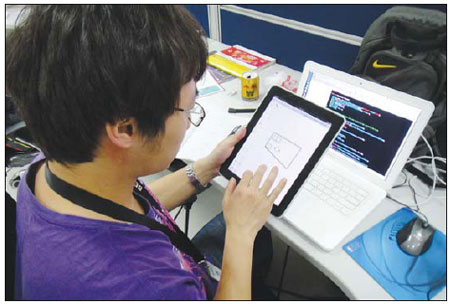China fast catching up with 3I's
Updated: 2011-05-20 10:45
By Zhang Jing (China Daily European Weekly)
Information technology outsourcing makes rapid strides in China
Zhao Bin, 32, is getting married in June in Hangzhou. Unlike his peers, he doesn't want to waste extra time to decorate his house for the new bride. Rather, he plans to get himself a new tool, iPlanit, with which he can pre-design the interior decoration and put all the virtual furniture in the proper place with accuracy on an iPad.
Little does Zhao know that the software program for iPlanit was not written in Silicon Valley, California, where Apple Inc is based, but in the "west silicon valley" of China, Xi'an.
To be more exact, the job was outsourced to UK-based EPR Media Ltd and four Chinese software engineers with Beyondsoft in Xi'an.
In the world of IT services, nothing dominates as much as the three I's - India, Ireland and Israel. But China is fast catching up. In 2006, China's Ministry of Commerce identified information technology outsourcing (ITO) as the core of its strategic economic development.
According to the Ministry of Industry and Information Technology, by the end of 2010, China's software exports had rocketed to some $20 billion (14.2 billion euros), twice what was expected in 2006.
Outsourced software exports also have the lion's share of the overall IT export pie. In 2009, the figure was $6.39 billion, representing 87.9 percent of the total.
|
 A software writer with Beyondsoft in Xi'an works on Apple's iPlanit. [Zhang Jing / China Daily]
|
Dalian-based Hisoft was ranked 65th last year in the list of top 100 outsourced IT companies by the International Association Outsourcing Professionals (IAOP). Other Chinese companies that appear in the list are Neusoft and Beyondsoft.
Many attribute the rapid development to government support. For example, outsourced IT service companies pay an income tax of just 15 percent, while the basic rate in the country is 33 percent when an enterprise's turnover reaches 100,000 yuan (10,900 euros) and above.
From 2009, companies also get from the central government 4,500 yuan per person as training fees for every college student it recruits and has contracted for one year and above.
The incentive is primarily aimed to enhance the employment rate of college graduates, even as it narrows the gap between theory and real-life engineering problems, such as developing software by vocational training.
"For outsourcing enterprises, other barriers lie in culture and language," says Liu Ning, general manager of CompuPacific International (CPI), which houses a total of over 1,000 employees, some 50 of whom are Americans and Europeans.
"The essence of business is trust. People tend to confuse language competence with technical ability. That's why we require our employees to be bi-lingual," says Liu.
"The business of service providing is very much different from selling visible products such as tea cups. You can drop the cups to the floor to show they are unbreakable. But with IT services, it's like going to the barbers. You won't be able to tell whether you will be pleased with the new haircut until the barber finishes. Only when the customers trust your sales persons, will they trust your service.
"The other important thing is to build effective cultural communication and mutual understanding," Liu says. "The Western way of doing business is different from that in China."
"In China, the management is more result-oriented. They assign a task and expect the employee to report only when he or she finishes the work. But this way of handling business would make our Western counterparts insecure, feeling it more or less like a black hole, without knowing what's happening in the process.
"Another example is, when a mistake is made, Chinese tend to let it go when they hear an apology like 'I'm sorry'. But Western employees tend to find out why the mistake has taken place and will find a solution to avoid its recurrence."
"The best way for an outsourcing IT enterprise to grow is to work with first rate companies in Europe and America, which allow you more freedom and encourage creativity," says Joseph Hsu, president and CEO of Xi'an Huatek Technologies Co Ltd. Hsu graduated from New York University and used to work for IBM's R&D department in Taiwan.
Many enterprises in cities such as Dalian and Wuxi work on outsourced services for Japanese and Korean companies. "But such work is more like a drill which doesn't allow any deviation from its screenplay. It has no added value at all.
"I believe, in the future, with substantial development, Chinese IT enterprises will eventually become competitive solution providers for businesses worldwide," says Hsu.
E-paper

Green works
Wuxi becomes 'test case' for facing country's environmental challenges
Preview of the coming issue
The global rise of Chinese brands
China-EU trade on solid ground
Specials

The song dynasty
There are MORE THAN 300 types of Chinese operas but two POPULAR varieties are major standouts

Cut above the rest
One of the world's oldest surgeons has performed more than 14,000 operations

From the ground up
Architect of Guangzhou Opera House has many projects under way, including 2012 Olympics.
